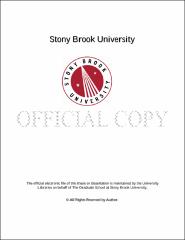| dc.identifier.uri | http://hdl.handle.net/11401/77231 | |
| dc.description.sponsorship | This work is sponsored by the Stony Brook University Graduate School in compliance with the requirements for completion of degree. | en_US |
| dc.format | Monograph | |
| dc.format.medium | Electronic Resource | en_US |
| dc.language.iso | en_US | |
| dc.publisher | The Graduate School, Stony Brook University: Stony Brook, NY. | |
| dc.type | Dissertation | |
| dcterms.abstract | Cyber Physical Systems (CPS) are distributed systems-of-systems that perform reliable data acquisition in order to build efficient data models. Data models are mathematical expressions that describe the attributes of the observed environments. These models can be used for monitoring, tracking and predicting the dynamics of the physical phenomena. Also, data models aid in formulating decision-making procedures under resource constraints. Data model construction in CPS is challenging because the dynamics of physical environments are hard to track in real-time through a distributed sensing network with limited bandwidth and local memory. Therefore, the limited resources must be optimally utilized to boost performance metrics. This dissertation presents a novel technique that uses distributed sensing to construct local models. A multi-level state variable lumping scheme is proposed that reduces communication traffic. A linear-programming based optimization scheme is designed to minimize the modeling error due to data losses and communication delays. Application goals help in defining the parameters of the cost function. The solution of this cost function is used to decide the resource allocation strategy. Error modeling is an important step in achieving this objective. As a part of this research, accurate models are constructed for different types of errors in the network. These include error due to data loss, communication delay, lack of synchronization and modeling errors. An ontological approach is proposed to build centralized models using data sampled in a distributed environment. The ontological representation is used for describing relationships between model parameters. These physical models are more meaningful since the relationships are extracted from experimental data using data mining as well as causal analysis. This helps in improving the model robustness, thereby enabling the system to respond better to unexpected changes in the dynamics of the physical entities. In the course of this research, three case studies have been explored: Detection and tracking of emergent gas clouds, Sound-based tracking for vehicular-traffic scenarios and thermal monitoring for 3-Dimensional integrated circuits. Several algorithms to detect and track emergent entities are proposed. Also, different techniques to maximize accuracy of tracking and prediction are discussed. Similar to networks of embedded systems, we can imagine networks of human beings and their interactions. Data model and knowledge extraction can also be performed to characterize the `creativity' of human subjects. For this purpose, we define metrics such as Novelty, Variety, Quality and Usefulness. Causal knowledge search using data from these experiments can give insight into the creative thinking process of human engineers. | |
| dcterms.available | 2017-09-20T16:52:14Z | |
| dcterms.contributor | Salman, Emre | en_US |
| dcterms.contributor | Doboli, Alex | en_US |
| dcterms.contributor | Milder, Peter | en_US |
| dcterms.contributor | Hong, Sangjin | en_US |
| dcterms.contributor | MacCarthy, Thomas. | en_US |
| dcterms.creator | UMBARKAR, ANURAG | |
| dcterms.dateAccepted | 2017-09-20T16:52:14Z | |
| dcterms.dateSubmitted | 2017-09-20T16:52:14Z | |
| dcterms.description | Department of Computer Engineering. | en_US |
| dcterms.extent | 196 pg. | en_US |
| dcterms.format | Application/PDF | en_US |
| dcterms.format | Monograph | |
| dcterms.identifier | http://hdl.handle.net/11401/77231 | |
| dcterms.issued | 2014-12-01 | |
| dcterms.language | en_US | |
| dcterms.provenance | Made available in DSpace on 2017-09-20T16:52:14Z (GMT). No. of bitstreams: 1
UMBARKAR_grad.sunysb_0771E_12041.pdf: 2831132 bytes, checksum: 3254d276bdde0e247a6978115f93e428 (MD5)
Previous issue date: 1 | en |
| dcterms.publisher | The Graduate School, Stony Brook University: Stony Brook, NY. | |
| dcterms.subject | Computer engineering | |
| dcterms.subject | Causality, Creativity, Cyber Physical Systems, Data Modeling, Sensor Networks | |
| dcterms.title | Performance-Optimized Detection, Tracking and Modeling of Physical Phenomena in Distributed Sensing Environments | |
| dcterms.type | Dissertation | |

